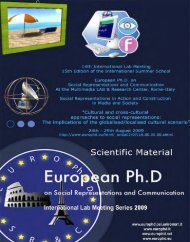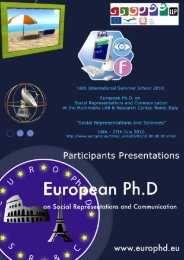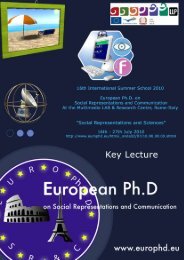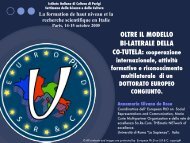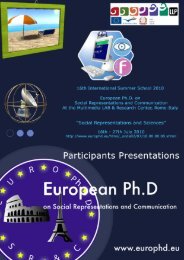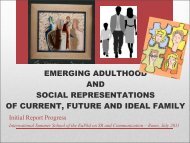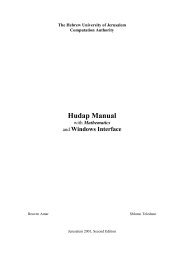The "boomerang" effect of the radicalism in discourse analysis
The "boomerang" effect of the radicalism in discourse analysis
The "boomerang" effect of the radicalism in discourse analysis
Create successful ePaper yourself
Turn your PDF publications into a flip-book with our unique Google optimized e-Paper software.
Moreover o<strong>the</strong>r authors have underl<strong>in</strong>ed at <strong>the</strong> same time a position open to an<br />
“<strong>in</strong>tegrative view”, but also attentive to <strong>the</strong> reductionism implicit <strong>in</strong> <strong>the</strong> <strong>radicalism</strong> <strong>of</strong> DA:<br />
“No doubt <strong>in</strong>terest <strong>in</strong> <strong>the</strong> conversational and rhetorical approach has permitted “a lucid and efficacious<br />
reread<strong>in</strong>g, <strong>in</strong> this specific perspective <strong>of</strong> many classical <strong>the</strong>mes and problems <strong>in</strong> social psychology, for<br />
example that <strong>of</strong> attitudes, social categorization, accounts” (De Grada and Mannetti, 1992). However, over<br />
and above <strong>the</strong> undoubted <strong>in</strong>terest <strong>of</strong> <strong>the</strong> contextualization <strong>of</strong> verbal exchanges, which <strong>the</strong>se types <strong>of</strong> approach<br />
permit by largely ignor<strong>in</strong>g <strong>in</strong>tra<strong>in</strong>dividual cognitive processes, <strong>the</strong> proposals which would conf<strong>in</strong>e <strong>the</strong> study<br />
<strong>of</strong> SRs exclusively to conversational <strong>analysis</strong> risk be<strong>in</strong>g limit<strong>in</strong>g and reductionist”.<br />
(de Rosa, 1994, p. 288)<br />
“However <strong>discourse</strong> <strong>analysis</strong> can <strong>in</strong>deed enrich social-representations studies (...). <strong>The</strong>refore, I agree<br />
with van Dijk (1990) who has this to say (...): "In my op<strong>in</strong>ion, no sound <strong>the</strong>oretical or explanatory framework<br />
can be set up for any phenomenon dealt with <strong>in</strong> social psychology without an explicit account <strong>of</strong> socially<br />
shared cognitive representations. Whereas <strong>discourse</strong> is <strong>of</strong> course <strong>of</strong> primary importance <strong>in</strong> this expression,<br />
communication and reproduction <strong>of</strong> social representation ... , this does not mean that <strong>discourse</strong> or its<br />
strategies are identical with such representations.”<br />
(Doise, 1993, p 168)<br />
“Although on several occasions we have ma<strong>in</strong>ta<strong>in</strong>ed - and still ma<strong>in</strong>ta<strong>in</strong> - <strong>in</strong>terest for a constructive<br />
<strong>in</strong>tegration <strong>of</strong> <strong>the</strong> <strong>the</strong>oretical and methodological prospects <strong>of</strong> <strong>discourse</strong> <strong>analysis</strong> <strong>in</strong> <strong>the</strong> wider framework <strong>of</strong><br />
<strong>the</strong> Social Representations <strong>the</strong>ory, we hold this “mono<strong>the</strong>istic” option to be excessively limit<strong>in</strong>g. If with<strong>in</strong> <strong>the</strong><br />
human species <strong>the</strong> word is a privileged channel for def<strong>in</strong><strong>in</strong>g, objectify<strong>in</strong>g and construct<strong>in</strong>g <strong>the</strong> reality, <strong>the</strong><br />
reality has not been exclusively def<strong>in</strong>ed by means <strong>of</strong> <strong>the</strong> word: images, sounds, conducts, rites... are o<strong>the</strong>r<br />
ways for generat<strong>in</strong>g and communicat<strong>in</strong>g “multiform” aspects (not necessarily complementary and, <strong>in</strong> some<br />
cases, antagonist) <strong>of</strong> social representations.”<br />
(de Rosa & Farr, <strong>in</strong> press)<br />
<strong>The</strong> <strong>in</strong>ventory <strong>of</strong> a representation, understood as an exhaustive summary <strong>of</strong> its discursive expressions,<br />
has no operative mean<strong>in</strong>g (...).<strong>The</strong> "competence", if you like, overruns <strong>the</strong> "performance" (...). <strong>The</strong> <strong>analysis</strong><br />
<strong>of</strong> <strong>the</strong> representations must <strong>of</strong> necessity exceed <strong>the</strong> simple discursive phenomenon considered as such (...).<br />
That <strong>the</strong> statement may be an <strong>effect</strong>, a concomitance or a trace <strong>of</strong> <strong>the</strong> representation does not imply that this<br />
possesses all <strong>the</strong> properties that can be discovered <strong>in</strong> <strong>the</strong> statement.<br />
(Rouquette, 1994, p. 170-171, my translation)<br />
“(...) it matters little for <strong>the</strong>se critics that <strong>the</strong> <strong>the</strong>ory <strong>of</strong> social representations has always <strong>in</strong>sisted on <strong>the</strong><br />
symbolic character <strong>of</strong> cognition (see Moscovici, 2000). Here <strong>the</strong> vagueness <strong>of</strong> social representations is held<br />
to be its <strong>in</strong>sufficiently radical departure from a ëmentalisticí <strong>discourse</strong>, but as Jovchelovitch (1996) has<br />
observed, <strong>the</strong> rush to evacuate <strong>the</strong> mental form from <strong>the</strong> <strong>discourse</strong> <strong>of</strong> social psychology is lead<strong>in</strong>g to <strong>the</strong> recreation<br />
<strong>of</strong> a form <strong>of</strong> behaviourism.”<br />
(Duveen, 2000, p.14)<br />
<strong>The</strong> need for a reconstruction <strong>of</strong> <strong>the</strong>se dynamics <strong>of</strong> confrontation with<strong>in</strong> <strong>the</strong> scientific<br />
community between different paradigmatic visions stems from <strong>the</strong> recognition that at<br />
times more than <strong>of</strong> dialogue it is a question <strong>of</strong> monologue, which sometimes assumes more<br />
<strong>the</strong> modality <strong>of</strong> a clash unilaterally pursued by <strong>the</strong> RDA, <strong>in</strong> which <strong>the</strong> prospect <strong>of</strong> o<strong>the</strong>r<br />
paradigms are rhetorically assumed solely for reaffirm<strong>in</strong>g <strong>the</strong> right to speak by difference,<br />
to autolegitimise oneself <strong>in</strong> a position that marks <strong>the</strong> territory by oppositions.<br />
<strong>The</strong> usefulness <strong>of</strong> <strong>the</strong> confrontation has been also recognized by <strong>the</strong> protagonists <strong>of</strong> <strong>the</strong><br />
meta-<strong>the</strong>oretical debate about SRT, such as Potter and Billig (1992), who write:<br />
“It is precisely a sign <strong>of</strong> health <strong>of</strong> this debate that it has revolved around compet<strong>in</strong>g <strong>the</strong>oretical<br />
frameworks. It has not rema<strong>in</strong>ed at <strong>the</strong> level <strong>of</strong> many psychological debates, which focus exclusively on<br />
empirical adequacy. <strong>The</strong> <strong>in</strong>tellectual debate <strong>of</strong> <strong>the</strong> “th<strong>in</strong>k<strong>in</strong>g society” should nei<strong>the</strong>r be characterised by<br />
10




